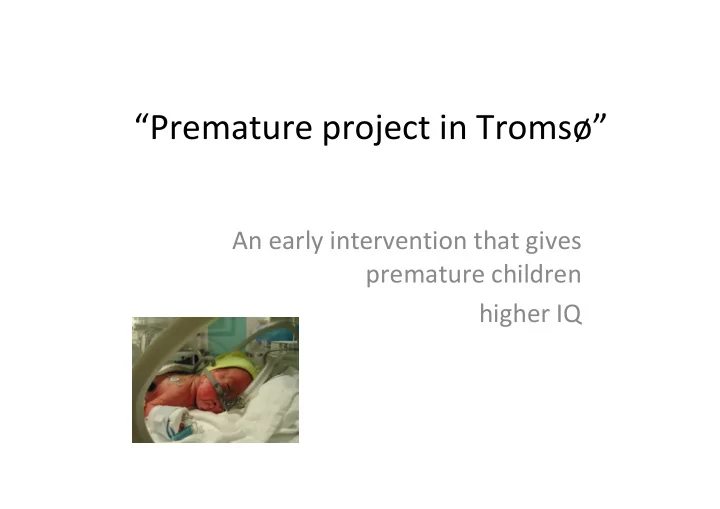

“Premature project in Tromsø” An early intervention that gives premature children higher IQ
Early intervention of premature infants less than 2000 grams. A research project. A collaboration between Department of Pediatrics, University Hospital, Tomsø and Institute of Clinical Medicine, University of Tromsø
� Avdeling for barne- og ungdomspsykiatri � Prof. John A. Rønning � Prof. Stein Erik Ulvund � Barneavdelingen � Overlege Lauritz Bredrup Dahl � Forskningsspl. Jorunn Tunby � Seksj. overlege Per Ivar Kaaresen � Inklusjon fra mars 1999 tom. sept. 2002 ���������������������� �
��������������������� ���������������������� �
������������������������������������������������������������������ �������� �������������������� �������� ����������� ����������� ��� ���������� ����������� ����������� ���� ���!�" �����" ��" !" �������������� ������ ����� ���� �� ������� �� �� �� ��� ������������� ��� !����� ���!�� ������ ������ ���"#�� ��"����$�%��� ������ ������ ������ ����� &�'� ������ ������ ����� ��!� (������$��������� ��� ������ ������ ������ "�)��� *+�"����,�-"� �%���� !����� ���!�� ������ ������ ��%$��.� ������ ������ ������ "�)��� �% %��" �������� ���
���� Early Intervention in Tromsø Introducing to the parents a method of social interaction with babies just before they left NICU for home
Intervention Modified version of the Vermont Mother Infant Transactional Program, inspired by Neonatal Behavioral Assessment Scale, NBAS The parents were trained in adjusting to the individual characteristics of the infant, and the transactional nature of development was emphasized. The parents were sensitized to the infant ´ s cues, with a particular emphasis on those that signal stimulus overload, distress and readiness for interaction.
���������������������� �
Intervention � One hour debrief of the preterm birth experiences � Seven daily 1-hour sessions last week before planned discharge � Four home-visits after discharge � Intervention administered by eight specially trained neonatal nurses
The Tromsø-version of the Vermont-program ������� ������������ ������� �������� ��������������� ���������� ���� ��� ���� ������ ����������� ������������������ � ������������ � ������ ����������� ����!� "����������#����� �������������� ����$� %��������&����������� ������ ����'���(������)��� �������*������ ������� ����+���������� ����� ���*�����������
1. Home visit: Consolidation and adjustment 2. Home visit : Mutual enjoyment through play 3. Home visit : Temperamental patterns 4. Home visit : Review of program and termination of the intervention – about 3 months after discharge
The goal of the intervension Teach parents to read the childs reactions to internal and external stimuli Teach parents to understand the childs natural changes in state levels And understand when the baby is receptive for social interaction - recognice the � golden moments �
Parenting Stress
A randomized controlled trial of the effectiveness of an early intervention program in reducing parenting stress in mothers and fathers of preterm infants. Per Ivar Kaaresen 1,2 , John A. Rønning 2 , Stein Erik Ulvund 2 , Lauritz B. Dahl 1,2 . 1) Pediatric Department, University Hospital North Norway, Tromsø, Norway 2) Institute of Clinical Medicine, University of Tromsø, Norway
Background � A preterm birth is a stressful event for the parents and family relations � Many studies have shown increased stress in mothers during the NICU stay � Longitudinal studies are few and the results are conflicting � Fathers less studied
Background � Increased parenting stress has been associated with later behavioral problems in both preterm and other children � No studies has examined the effects of an early intervention program in reducing parenting stress in both mothers and fathers after a preterm birth
Hypothesis � Parents of preterm infants experience increased parenting stress during the first year after a preterm delivery compared to their term peers � An early intervention program will reduce parenting stress in both mothers and fathers of a preterm infant
Methods � A randomized controlled trial � Preterm intervention group � Preterm control group: Standard discharge examinations � Term control group
Inclusion- and exclusion criteria � Birth weight < 2000 gram � Exclusion: � Congenital anomalies � Non-Norwegian speaking parents � Triplets or higher plurality
��������!����!����/��!/ �������� ��������������� ����!������ ������������ ���� ���� ���� "�����#��$��%������&'() +�*��&���) +����&�-�) ��+��&��*) �**�� +***�$ -* +� +**+�� +,**�$ +- +� +,*+�� -***�$ �� �+ .�/����������$�%������&'() �*���&��-) �*�+�&��,) �����&+��) 0�-��# +��&-,) +��&-�) -��� �-�# ���&��) ���&,*) ���������������������� -+
Instrument � Parenting Stress Index (PSI) � Self-reported questionaire � 101 questions measured on a 5-point scale � Child Domain: Measures stress related to the child’s characteristics � Parent Domain: Measures stress related to the parents themselves � Total Stess is the sum of Child and Parent Domain
PSI � The PSI was administered only to the mother at 6 months, to both mother and father at 1, 2, 3, 5 years
Patients � 203 infants with birth weight<2000 g born from March 1999 to August 2002 � 136 were randomized (14 died,13 non-Norwegian speking parents, 22 parental refusals, 8 other) � 6 were later withdrawn
PSI at 6 months - mothers � #��������������� #������� #�����������������$� %����������������� ������������� ������������� � � �� �����/*�0� �� �����/*�0� �������11����"�� +�2��-��� �� �����/*�0� /������0� / � �� 0� � � � � � � � � &�������� �#�����%.���� ��� �����&+,�-)� ��� ���*�&+���)� ����&+�����+-�*)� ����� �+� �����&+���)� � ����� ���%.���� ����� �+� ++��*�&-*��)� ��� +*����&+���)� ����&+�-���+,��)� �-� ++*���&-*��)� � 3% ���* ����� ������ ,�� -+-�-�&���-)� �-� +�,���&�*��)� +����&,�-���-��,)� ��� +�����&�*�,)� � �
Recommend
More recommend